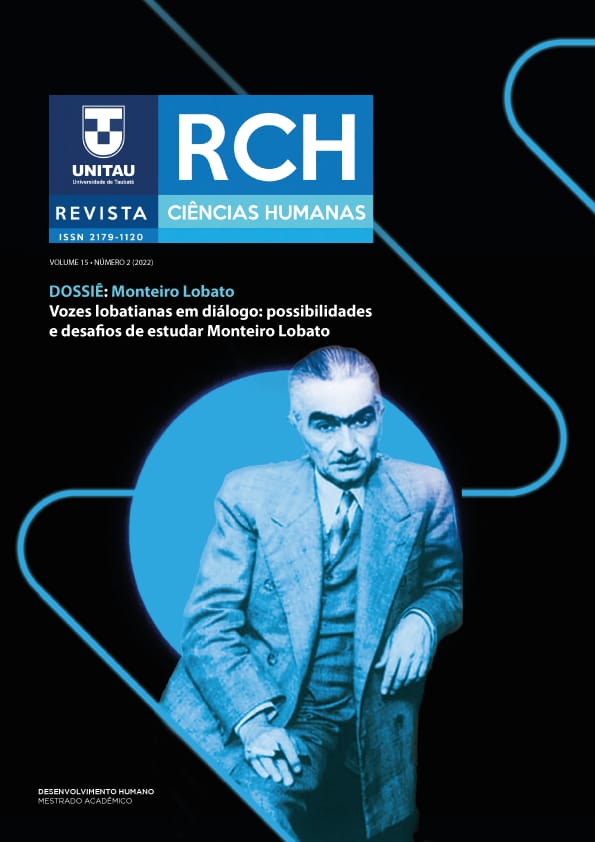THE JECA WITHOUT POSSESSIONS
the social conditions for the transformation of Jeca Tatu in Zé Brasil
DOI:
https://doi.org/10.32813/2179-1120.2022.v15.n2.a862Keywords:
Literature and Politics, United States, Monteiro Lobato, Sanitary Movement.Abstract
The aim of this article was to analyze the process, the conditions, and the references that the writer Monteiro Lobato received over time, in a socio-historical perspective to understand the way in which, after having created the figure of Jeca Tatu with a pejorative connotation of the caipira, the writer created Zé Brasil, rehabilitating Jeca and emphasizing the political dimension. Methodologically, the research was carried out from a documental analysis of Monteiro Lobato's work and his epistolary production. In the literature review was considered the study of his stay in the United States and his impressions about the North American conditions for development. The context of his literary production was also considered while creating Zé Brasil. It was concluded that the transformation of Jeca Tatu into Zé Brasil took place within the scope of the historical process and the contextualization of the writer's trajectory and his quest to understand and transform Brazil. This transformation directly involves the agrarian question in the country and the search for economic alternatives for Brazil.
Metrics
References
Abdala, Rachel Duarte. (2002). Zé Brasil: a questão agrária e a questão literária. novas perspectivas de análise do livreto de Monteiro Lobato. In. IOKOI, Zilda Márcia Gricoli (org.) História e Linguagens. São Paulo: Humanitas.
Azevedo, Carmen Lucia de; Camargos, Marcia; Sacchetta, Vladimir. (1997), Monteiro Lobato: Furacão na Botocúndia. São Paulo, Editora Senac.
Passiani, Enio. (2003) Na Trilha do Jeca: Monteiro Lobato e a formação do campo literário no Brasil. Bauru: EDUSC/ANPOCS.
Sevcenko, Nicolau. (1999) Literatura como Missão: Tensões Sociais e Criação Cultural na Primeira República. São Paulo: Brasiliense.
Obras de Monteiro Lobato:
Lobato, Monteiro. (1972). A Barca de Gleyre. São Paulo: Brasiliense.
Lobato, Monteiro. (1951). América. São Paulo: Brasiliense.
Lobato, Monteiro. (1972). Cartas Escolhidas. São Paulo: Brasiliense.
Lobato, Monteiro. (2010). Cidades Mortas. São Paulo: Editora Globo.
Lobato, Monteiro. (1964). Conferência, Artigos e Crônicas. São Paulo: Brasiliense.
Lobato, Monteiro. (1968). Na Antevéspera. São Paulo: Brasiliense.
Lobato, Monteiro. (1951). Negrinha. São Paulo: Brasiliense.
Lobato, Monteiro. (1956). O Escândalo de Petróleo e Ferro. São Paulo: Brasiliense.
Lobato, Monteiro. (1964). Prefácios e Entrevistas. São Paulo: Brasiliense.
Lobato, Monteiro. (1968). Mister Slang e o Brasil e Problema Vital. São Paulo: Brasiliense.
Lobato, Monteiro. (1951). Urupês. São Paulo: Brasiliense.
Lobato, Monteiro. (1947). Zé Brasil. Rio de Janeiro: Editorial Vitória. Ilustrações de Percy Deanne.
Downloads
Published
How to Cite
Issue
Section
License
Copyright (c) 2022 Human Sciences Journal - RCH

This work is licensed under a Creative Commons Attribution 4.0 International License.
The publications of the Human Sciences Journal are registered under the Creative Commons Attribution CC-BY license.
1. The contents of the manuscripts are the exclusive responsibility of their author.
2. It is allowed the total or partial reproduction of manuscripts published in the journal, provided that the source is cited.
3. When submitting their manuscript to the Journal, the authors certify that they are of their own authorship and unpublished (not published in any digital or printed media).
4. The copyright of the articles published in the Journal are of the author, with first publication rights reserved for this journal.
5. For disclosure purposes, the Journal may replicate the works published in this journal in other media, such as social networks (Facebook, Academia.Edu, etc.).
6. The Journal is of public access, therefore, the authors who submit manuscripts agree that they are of free use.
7. In case of any illegality, fraud, or other attitude that puts in doubt the honesty of the publication, especially the practice of plagiarism, the manuscript will be automatically rejected.
8. If the manuscript has already been published, it will be immediately removed from the base of the Journal, its citation linked to the Journal will be prohibited and the cancellation of the referred publication shall be reported in the next issue of the one in which the article was published. In case of the procedure for the withdrawal of the paper the authors will be informed beforehand, being guaranteed the right to a broad defense.
9. The personal data provided by the authors will be used exclusively for the services provided by this publication and will not be made available for other purposes or to third parties.





